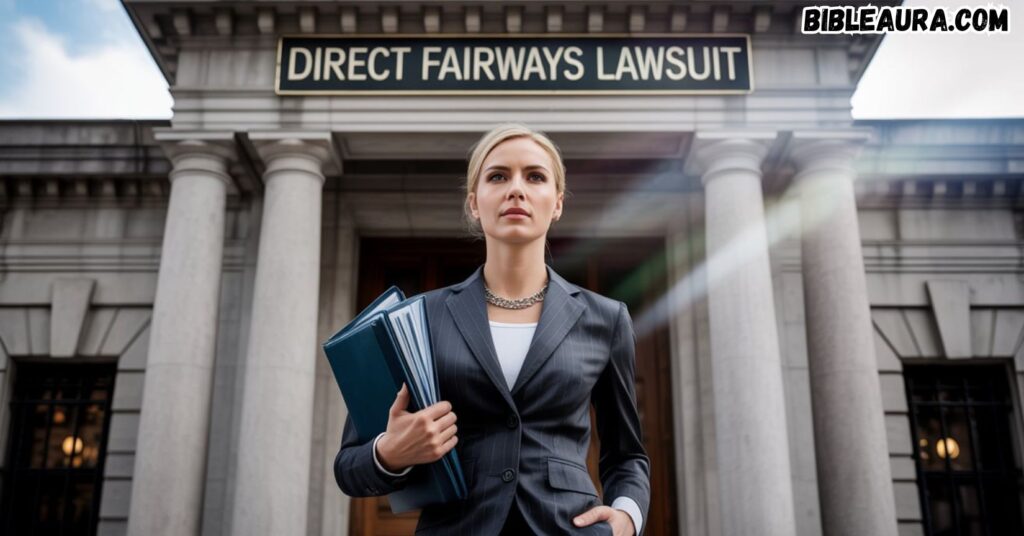The Direct Fairways Lawsuit has garnered significant attention, raising important questions about ethical practices within the advertising industry. As allegations surface, they not only affect the company itself but also resonate throughout the marketing landscape, particularly for small businesses.
In this post, we’ll explore the intricate details of the lawsuit, the allegations against Direct Fairways, and the broader implications for stakeholders involved.
The Genesis of the Lawsuit
The origins of the Direct Fairways lawsuit trace back to several complaints from small business owners who felt misled by the company’s advertising practices. Founded in Tempe, Arizona, Direct Fairways specializes in golf course advertising, providing services like scorecards, yardage books, and promotional items. However, as the business grew, so did the number of complaints, leading to the current legal storm.
Timeline of Events
- Initial Complaints: Reports of misleading sales practices began surfacing in early 2022.
- Legal Action: By mid-2023, a group of plaintiffs formally filed a lawsuit against Direct Fairways Lawsuit LLC.
- Media Coverage: The case gained media traction, prompting discussions in consumer protection agencies.
- Ongoing Legal Proceedings: As of 2024, multiple legal proceedings are underway, with potential for financial settlements.
Allegations Against Direct Fairways
The allegations against Direct Fairways are serious and multifaceted. Let’s delve into the main points of contention that have emerged.
Misleading Sales Practices
One of the core allegations involves misleading sales practices. Plaintiffs assert that the company employed aggressive sales tactics that misrepresented the effectiveness of their advertising solutions. For example, sales representatives allegedly promised high visibility and engagement rates that were not supported by actual data.
- Deceptive Marketing: Claims of exaggerated benefits led many small businesses to invest in advertising packages that did not deliver as promised.
- Pattern of Complaints: A growing number of complaints registered with the Better Business Bureau (BBB) indicated a trend of dissatisfaction among clients.
Unauthorized Billing and Hidden Fees
Another significant issue revolves around unauthorized billing and hidden fees. Many customers reported being charged fees that were not disclosed upfront, leading to disputes over payment.
- Billing Fraud: Customers found unexpected charges on their invoices, raising suspicions about the company’s billing practices.
- Refund Policies: When customers sought refunds, they often faced hurdles, with unclear reimbursement terms complicating the process.
Failure to Deliver Promised Services
The lawsuit also highlights Direct Fairways’ failure to deliver promised services. Clients expected timely delivery of advertising materials, but many experienced delays or received products that did not meet their specifications.
- Breach of Contract: Plaintiffs argue that the company’s inability to fulfill its contractual obligations constitutes a breach of contract.
- Service Delays: Numerous testimonials reveal frustration over undelivered products and poor customer service.

Direct Fairways’ Defense and Public Response
In response to the allegations, Direct Fairways has issued statements attempting to defend their practices. The company emphasizes a commitment to customer satisfaction and contends that many complaints stem from misunderstandings.
Official Statements
- Transparency: Direct Fairways claims to prioritize transparency in their business dealings.
- Customer Satisfaction: They assert that a significant number of clients have benefited from their services, citing testimonials from satisfied customers.
Public Reaction
The public response has been mixed. While some loyal clients continue to support the company, many others feel disillusioned. The media coverage has amplified scrutiny, and industry observers are closely monitoring how the situation unfolds.
Legal Proceedings and Potential Outcomes
As the lawsuit progresses through the legal system, various outcomes are possible. Legal experts suggest that the case could set important precedents in the advertising industry.
Current Status of the Lawsuit
- Ongoing Litigation: The case is currently in the discovery phase, where both sides present evidence and testimonies.
- Potential for Settlements: Legal analysts speculate that financial settlements could be a likely outcome, especially if the evidence favors the plaintiffs.
Implications for Direct Fairways
- Reputation Damage: A negative ruling could severely impact Direct Fairways’ reputation and financial stability.
- Changes in Business Practices: The company may need to revise its contracts and refund policies to align with consumer protection regulations.

Implications for Small Businesses and the Advertising Industry
The Direct Fairways lawsuit has broader implications that extend beyond the company itself. It serves as a cautionary tale for small businesses navigating the advertising landscape.
Impact on Advertising Practices
- Increased Scrutiny: This legal case underscores the need for ethical practices within the advertising industry.
- Regulatory Changes: Expect potential changes in regulations that govern advertising practices, particularly regarding transparency and accountability.
Advice for Small Businesses
Small business owners should take this situation as a learning opportunity. Here are some key takeaways:
- Due Diligence: Always research a marketing company’s reputation before signing contracts.
- Documentation: Keep detailed records of all communications and transactions.
- Review Policies: Understand refund policies and ensure they are fair and clearly stated.
Ethical Practices in Advertising
The Direct Fairways lawsuit highlights the importance of ethical business practices. Companies should prioritize transparency and accountability to build trust with clients.
Lessons Learned and Moving Forward
As the lawsuit unfolds, several important lessons emerge for both consumers and businesses. The following concepts are crucial for navigating the advertising industry:
Key Takeaways
- Due Diligence: Conduct thorough research before engaging with any marketing company.
- Transparency: Ensure all terms are clearly communicated and understood.
- Accountability: Companies should be held accountable for their promises and practices.
Recommendations for Best Practices
- Client Testimonials: Seek reviews and testimonials from previous clients to gauge the reliability of a service provider.
- Clear Contracts: Ensure contracts are detailed, specifying delivery timelines and refund policies.
- Consumer Protection: Stay informed about your rights as a consumer, and don’t hesitate to report unethical practices to consumer protection agencies.
FAQs
What is the Direct Fairways Lawsuit about?
The Direct Fairways Lawsuit centers on allegations of misleading sales practices, unauthorized billing, and failure to deliver promised services, raising significant concerns in the advertising industry.
How did the Direct Fairways lawsuit originate?
The Direct Fairways lawsuit originated from numerous complaints by small business owners who felt misled by the company’s advertising tactics and unfulfilled promises.
What are the main allegations against Direct Fairways?
Key allegations in the Direct Fairways lawsuit include misleading sales practices, hidden fees, and a general failure to deliver on contractual obligations promised to clients.
What implications does the Direct Fairways lawsuit have for small businesses?
The Direct Fairways lawsuit highlights the need for transparency and ethical practices in advertising, serving as a cautionary tale for small businesses engaging with marketing companies.
How can businesses protect themselves from issues like those in the Direct Fairways lawsuit?
To avoid pitfalls similar to those in the Direct Fairways lawsuit, businesses should conduct due diligence, clearly understand contracts, and ensure transparent communication with service providers.
Conclusion
The Direct Fairways lawsuit serves as a pivotal moment in the advertising industry, reflecting the need for ethical business practices and accountability. As this legal case progresses, its implications will likely resonate throughout the sector, particularly for small businesses seeking effective marketing solutions.
By understanding the allegations, the responses, and the potential outcomes, stakeholders can better navigate the complexities of advertising. This case is a reminder of the importance of transparency, ethical practices, and consumer advocacy in building lasting business relationships.
Stay informed and proactive; the landscape of advertising is ever-changing, and being well-prepared can make all the difference.
Read more knowledgeable blogs on Bible Aura

Piper McMillan is a passionate writer and educator dedicated to sharing the beauty and depth of the Bible. As the author behind the Piper McMillan website, she explores Bible verses, unlocks biblical narratives, and provides insights for living a Christ-centered life. Through warm, approachable, and inspiring articles, Piper guides readers to deepen their understanding of Scripture and apply its timeless wisdom to daily living. Her mission is to uplift, educate, and help others walk faithfully with God, rooted in His word.



